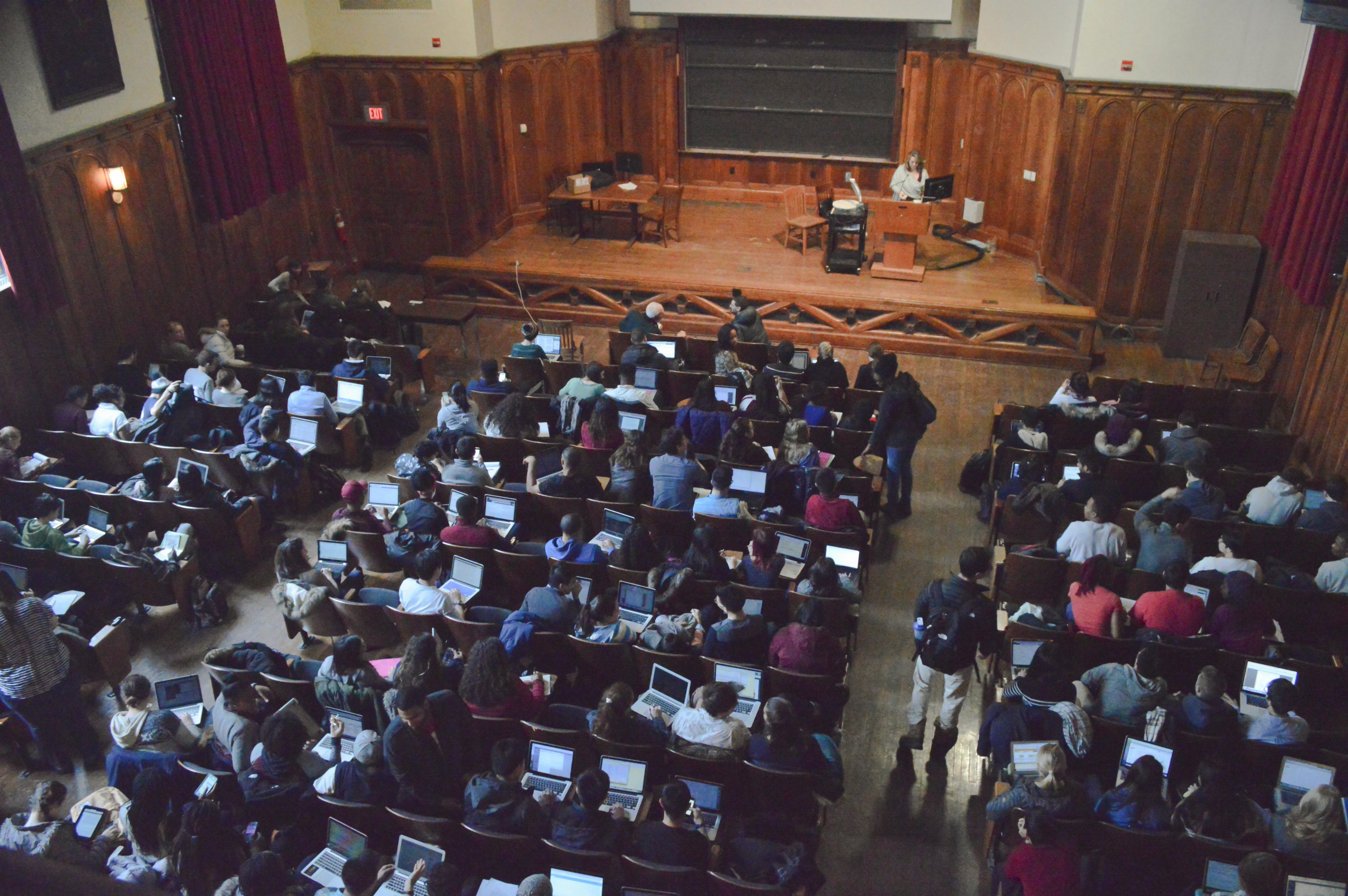
A perfect storm of complications has descended upon the popular course “Race and Gender in American Literature,” with staggeringly high student interest creating scheduling confusions and calling attention to yet another expected faculty departure in the field of ethnic studies.
The class is currently the largest in Yale College, with 382 students enrolled as of press time, according to the course demand statistics website. At one point during shopping period, it attracted more than 600 students. While interest in the course has grown steadily over the past several years, the sudden spike in interest is due to a unique set of circumstances. Campus protests and discussion about race this fall have piqued student interest in studying related topics, according to students interviewed. The course is also known to have a relatively low workload. But students may also have flocked to the class because this is the last time American Studies and Ethnicity, Race and Migration professor Birgit Brander Rasmussen will teach it, as she will leave Yale at the end of this semester.
The spike in demand has not gone smoothly. Shoppers interviewed described scenes of confusion and chaos as students spilled out of the lecture hall into the hallways during the first class, and the subsequent scheduling disarray — in which sections have been oversubscribed, canceled and mislabeled — has been widely documented on social media.
“We ended up with massive chaos because sections kept getting dropped, something I have never seen in all my time teaching at three different universities,” Rasmussen said. “It was incredibly stressful for everyone, including the students.”
Paul Won ’18 said some of the scheduling chaos is the result of mistakes on the part of the Registrar’s Office, which he said had deleted sections that students had been assigned to, or accidentally labeled non-writing credit sections as writing sections and then changed them back without notice. Rasmussen, too, said she has heard many “unbelievable” stories about students being dropped, sections being canceled and even newly created sections also being canceled suddenly. Currently, only six of the course’s 22 sections fulfill the writing credit, although Rasmussen said the situation remains uncertain.
Representatives at the Registrar’s Office were not available for comment.
Dean of Strategic Initiatives for Yale College, the Graduate School and Faculty of Arts and Sciences Pamela Schirmeister said every semester, there is a small number of courses that far exceed the expected enrollment during shopping period. She said if a particular lecture requires additional teaching fellows, the administration would provide them. However, in some cases, the demand for teaching fellows exceeds the number of qualified ones available.
“We have never said that any given course may offer as many [writing] sections as potential enrollment demands, because we cannot always provide a sufficient number of qualified people to teach in those sections,” Schirmeister said. “It’s a simple pedagogical issue: we do not want to offer sections in excess of the number of qualified teaching fellows available to us.”
Rasmussen said she had expected increased interest in the course due to campus events last fall, but she said the actual numbers have blown her away.
Many students interviewed said they were frustrated at the scheduling disarray and their inability to enroll in writing sections, but they said they remain interested in taking the course, partly due to its timely subject and accessible nature.
Won said he is interested in the course because he wants to learn more about the race and gender discussions on campus from a professional, and because he wanted a smooth introduction to English classes at Yale.
However, he described his experience so far as “very frustrating.” Won said the section he signed up for was originally listed as a writing section, which he needs to fulfill his distributional requirements. But the section was unexpectedly changed into a humanities-designated one, and he was only able to stay in the class because he was able to switch with a friend.
Many students have had to drop the class because of the unavailability of writing sections. Several posts have appeared on the popular Facebook group “Overheard at Yale,” as well as various textbook exchange groups, from students who bought the books for the class but are now unable to take it.
“I feel like the writing credit situation started out messy, and has ended in a pretty unsatisfactory manner,” Justin Yeh ’19 said. “Last time I checked, the administration only decided to open six writing sections, so a lot of people who needed the writing credit have been unable to get it.”
Mohamed Karabatek ’19 said he might have taken the class next year instead of this year, but he decided to take it now because he had heard that Rasmussen is leaving and his friends had highly recommended the class.
He called the situation a “giant mess,” noting that Rasmussen has sent around eight emails in the course of two days trying to reassure students and keep them updated.
In one of the emails, Rasmussen called the scheduling difficulties “systemic” and said the problem requires real attention from higher administrators.
Yale College Dean Jonathan Holloway said his office had expected a jump in student interest and is managing the unexpected course demand.
“Due to shopping demand, things are extremely fluid when a class explodes like this,” he said.







